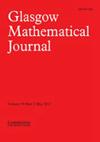A characterization of potent rings
IF 0.4
4区 数学
Q3 MATHEMATICS
引用次数: 1
Abstract
Abstract An associative ring R is called potent provided that for every $x\in R$ , there is an integer $n(x)>1$ such that $x^{n(x)}=x$ . A celebrated result of N. Jacobson is that every potent ring is commutative. In this note, we show that a ring R is potent if and only if every nonzero subring S of R contains a nonzero idempotent. We use this result to give a generalization of a recent result of Anderson and Danchev for reduced rings, which in turn generalizes Jacobson’s theorem.强环的一个性质
摘要一个结合环R称为强环,条件是R$中的每一个$x\,都有一个整数$n(x)>1$,使得$x^{n(x)}=x$。N.Jacobson的一个著名结果是,每个有效环都是可交换的。在这个注记中,我们证明了环R是有效的当且仅当R的每个非零子环S都包含一个非零幂等元。我们用这个结果给出了Anderson和Danchev最近关于约化环的一个结果的推广,这个结果又推广了Jacobson定理。
本文章由计算机程序翻译,如有差异,请以英文原文为准。
求助全文
约1分钟内获得全文
求助全文
来源期刊
CiteScore
1.10
自引率
0.00%
发文量
36
审稿时长
6-12 weeks
期刊介绍:
Glasgow Mathematical Journal publishes original research papers in any branch of pure and applied mathematics. An international journal, its policy is to feature a wide variety of research areas, which in recent issues have included ring theory, group theory, functional analysis, combinatorics, differential equations, differential geometry, number theory, algebraic topology, and the application of such methods in applied mathematics.
The journal has a web-based submission system for articles. For details of how to to upload your paper see GMJ - Online Submission Guidelines or go directly to the submission site.

 求助内容:
求助内容: 应助结果提醒方式:
应助结果提醒方式:


